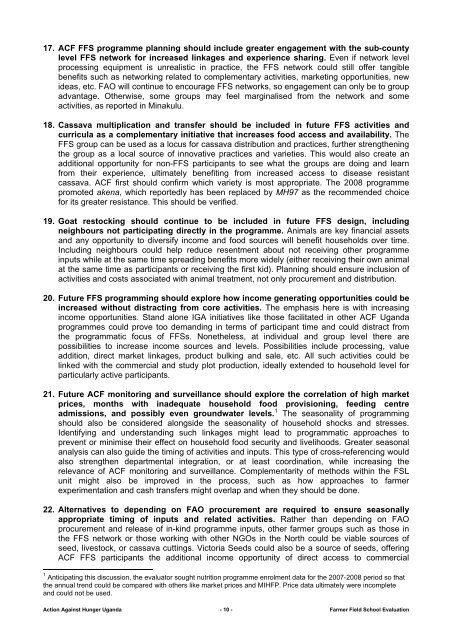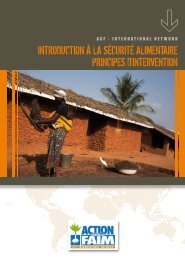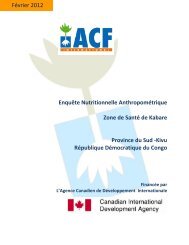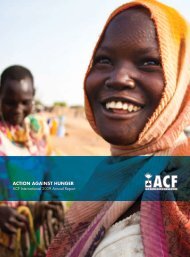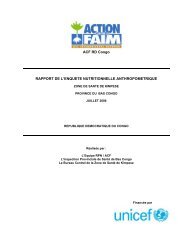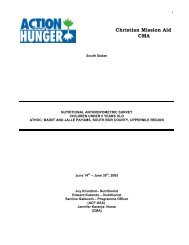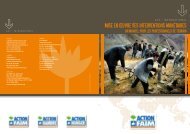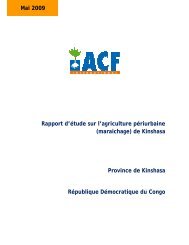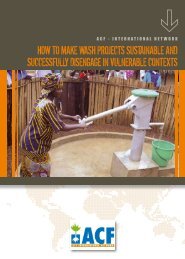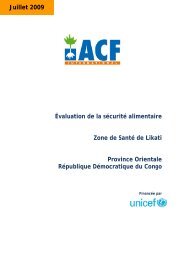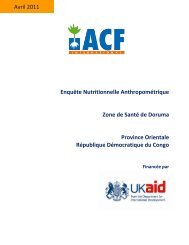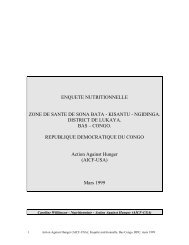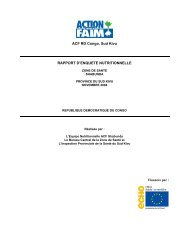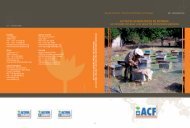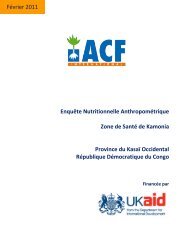Participatory Evaluation of our 2008 - Action Against Hunger
Participatory Evaluation of our 2008 - Action Against Hunger
Participatory Evaluation of our 2008 - Action Against Hunger
You also want an ePaper? Increase the reach of your titles
YUMPU automatically turns print PDFs into web optimized ePapers that Google loves.
17. ACF FFS programme planning should include greater engagement with the sub-county<br />
level FFS network for increased linkages and experience sharing. Even if network level<br />
processing equipment is unrealistic in practice, the FFS network could still <strong>of</strong>fer tangible<br />
benefits such as networking related to complementary activities, marketing opportunities, new<br />
ideas, etc. FAO will continue to enc<strong>our</strong>age FFS networks, so engagement can only be to group<br />
advantage. Otherwise, some groups may feel marginalised from the network and some<br />
activities, as reported in Minakulu.<br />
18. Cassava multiplication and transfer should be included in future FFS activities and<br />
curricula as a complementary initiative that increases food access and availability. The<br />
FFS group can be used as a locus for cassava distribution and practices, further strengthening<br />
the group as a local s<strong>our</strong>ce <strong>of</strong> innovative practices and varieties. This would also create an<br />
additional opportunity for non-FFS participants to see what the groups are doing and learn<br />
from their experience, ultimately benefiting from increased access to disease resistant<br />
cassava. ACF first should confirm which variety is most appropriate. The <strong>2008</strong> programme<br />
promoted akena, which reportedly has been replaced by MH97 as the recommended choice<br />
for its greater resistance. This should be verified.<br />
19. Goat restocking should continue to be included in future FFS design, including<br />
neighb<strong>our</strong>s not participating directly in the programme. Animals are key financial assets<br />
and any opportunity to diversify income and food s<strong>our</strong>ces will benefit households over time.<br />
Including neighb<strong>our</strong>s could help reduce resentment about not receiving other programme<br />
inputs while at the same time spreading benefits more widely (either receiving their own animal<br />
at the same time as participants or receiving the first kid). Planning should ensure inclusion <strong>of</strong><br />
activities and costs associated with animal treatment, not only procurement and distribution.<br />
20. Future FFS programming should explore how income generating opportunities could be<br />
increased without distracting from core activities. The emphasis here is with increasing<br />
income opportunities. Stand alone IGA initiatives like those facilitated in other ACF Uganda<br />
programmes could prove too demanding in terms <strong>of</strong> participant time and could distract from<br />
the programmatic focus <strong>of</strong> FFSs. Nonetheless, at individual and group level there are<br />
possibilities to increase income s<strong>our</strong>ces and levels. Possibilities include processing, value<br />
addition, direct market linkages, product bulking and sale, etc. All such activities could be<br />
linked with the commercial and study plot production, ideally extended to household level for<br />
particularly active participants.<br />
21. Future ACF monitoring and surveillance should explore the correlation <strong>of</strong> high market<br />
prices, months with inadequate household food provisioning, feeding centre<br />
admissions, and possibly even groundwater levels. 1 The seasonality <strong>of</strong> programming<br />
should also be considered alongside the seasonality <strong>of</strong> household shocks and stresses.<br />
Identifying and understanding such linkages might lead to programmatic approaches to<br />
prevent or minimise their effect on household food security and livelihoods. Greater seasonal<br />
analysis can also guide the timing <strong>of</strong> activities and inputs. This type <strong>of</strong> cross-referencing would<br />
also strengthen departmental integration, or at least coordination, while increasing the<br />
relevance <strong>of</strong> ACF monitoring and surveillance. Complementarity <strong>of</strong> methods within the FSL<br />
unit might also be improved in the process, such as how approaches to farmer<br />
experimentation and cash transfers might overlap and when they should be done.<br />
22. Alternatives to depending on FAO procurement are required to ensure seasonally<br />
appropriate timing <strong>of</strong> inputs and related activities. Rather than depending on FAO<br />
procurement and release <strong>of</strong> in-kind programme inputs, other farmer groups such as those in<br />
the FFS network or those working with other NGOs in the North could be viable s<strong>our</strong>ces <strong>of</strong><br />
seed, livestock, or cassava cuttings. Victoria Seeds could also be a s<strong>our</strong>ce <strong>of</strong> seeds, <strong>of</strong>fering<br />
ACF FFS participants the additional income opportunity <strong>of</strong> direct access to commercial<br />
1 Anticipating this discussion, the evaluator sought nutrition programme enrolment data for the 2007-<strong>2008</strong> period so that<br />
the annual trend could be compared with others like market prices and MIHFP. Price data ultimately were incomplete<br />
and could not be used.<br />
<strong>Action</strong> <strong>Against</strong> <strong>Hunger</strong> Uganda - 10 - Farmer Field School <strong>Evaluation</strong>


